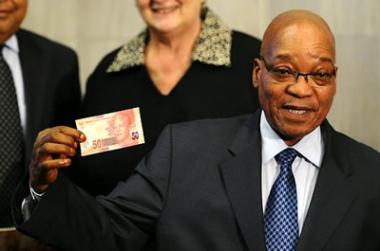S.Africa Govt responds to Fitch downgrade rating
 National symbol: President Jacob Zuma shows off the new 50 rand bank note with former president Nelson Mandela's image.
National symbol: President Jacob Zuma shows off the new 50 rand bank note with former president Nelson Mandela's image.
The rand slid against the US dollar before noon on Friday after Fitch Ratings lowered South Africa’s credit rating to the second- lowest investment grade due to slowing economic growth, a widening budget deficit and rising unemployment.
National Treasury says government is consistently making efforts to address the concerns identified in Fitch's rating review, which is aimed at mitigating growth and socio-economic concerns.
Fitch on Thursday downgraded South Africa's long term foreign currency credit rating to "BBB" from "BBB+", the long term local currency credit rating to "BBB+" from "A" and the short term credit rating to "F3" from "F2".
Fitch has placed the country on a stable credit outlook. “South Africa’s investment grade rating is underpinned by a generally sound banking system, a deep local bond market” and “a floating exchange rate and inflation-targeting regime that is an effective shock absorber,” the company said in its statement.
Protests over poor service delivery increased to record levels in 2012 and the economy has been beset by violent strikes that have affected growth and the current account.
The mining strikes, which primarily hit the gold and platinum sectors and drew in more than 100,000 workers at their peak, were resolved around October and November. But more than 50 people were killed in strike-related violence, while strikes and stoppages last year cost the industry more than R10bn in lost production.
The industrial strike also graphically highlighted mounting frustrations among many South Africans about the high levels of unemployment and poverty in one of the world’s most unequal societies more than 18 years after the end of apartheid.
This week, some 1,500 farm workers in the wine-producing Western Cape province went on strike demanding that their minimum wage is raised from R69 a day to R150. That unrest has also been marred by violence, but has yet to have a significant impact on wine producers, which are due to begin their harvest this month.
According to National Treasury, Fitch noted that South Africa's economic growth performance has deteriorated, which it said was likely to affect public finances and exacerbate social and political tensions.
Other reasons Fitch cited for the downgrade included a secular decline in competitiveness, which it said reflects wage settlements above productivity and infrastructure constraints, which it believes to have contributed to a widening current account deficit. The ratings agency said the country's public finances have deteriorated, and social and political tensions have increased.
"Fitch has indicated that the stable outlook is due to its belief that South Africa's credit strength will limit the speed, magnitude and the likelihood of a further potential downgrade over the typical two-year outlook horizon," said National Treasury.
It said some of the drivers of the downgrade have their roots in the protracted crisis in the Eurozone, South Africa's significant trading partner.
National Treasury said government was aware of the challenges of poverty and unemployment the country was facing.
"At its recent conference, the ruling African National Congress (ANC) endorsed the National Development Plan (NDP), which identifies the constraints to faster growth and presents a roadmap to a more inclusive economy that will address South Africa's socio-economic imbalances and challenges.
"The conference resolutions give certainty on economic policy, which the Fitch report does not seem to fully to appreciate. Government will prioritise the implementation of the NDP with the aim of achieving higher levels of growth."
It said the 2012 Medium Term Budget Policy Statement (MTBPS) published in October sets out a disciplined fiscal framework that keeps the expenditure envelope that was published in February unchanged.
"It balances support for the economy in the immediate term with fiscal consolidation over the medium to long term. It provides for a sustained investment in growth inducing infrastructure.
"The budget framework set out in the MTBPS demonstrates government's unambiguous commitment to maintaining debt and expenditure growth within sustained levels. These principles will continue to underpin South Africa's fiscal stance."
While sub-Saharan Africa has enjoyed average gross domestic product growth of about 5.5 per cent in 2012, South Africa’s economy was forecast to expand by about 2.5 per cent last year.
That is partly because as the continent’s most developed economy, South Africa is among the most heavily exposed emerging markets to the eurozone crisis, with about a third of its manufactured exports shipped to Europe.













